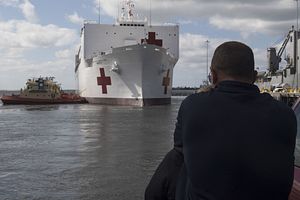The United States and its Asian partners are presently engaged in an important regional enterprise while once again denying themselves and Taiwan the benefits of Taipei’s participation.
Pacific Partnership 2018 has three stated purposes — enhance disaster relief responsiveness, strengthen defense cooperation, and elevate female participation in security affairs — all areas in which Taiwan has special experience, capabilities, and needs.
The mission involves more than 800 military and civilian personnel from the United States, Canada, the United Kingdom, South Korea, Singapore, Australia, France, Peru, and Japan working together with other regional partners to foster “preparedness in dealing with vulnerable populations — women, children, elderly and disabled — during and in the aftermath of crises.” Taiwan has had more than its share of experience in responding to natural disasters, both as a victim and as a first responder and generous donor to other impacted countries. Situated as it is in the regional vortex of geological and meteorological forces, it has dealt with the human and infrastructure devastation caused by typhoons, earthquakes, tsunamis, and other natural events.
Taiwan’s organizations provided the first foreign emergency relief assistance to the victims of the 1991 cyclone in Bangladesh. In 1999, Taiwan suffered a major earthquake; Japan was an early and major aid donor. Ten years later, Taiwan was hit by Typhoon Morakot and Japan again was one of the first to come to the rescue. In 2011, Japan was struck by the devastating earthquake, tsunami, and nuclear meltdown and Taiwan quickly showed its gratitude for Japan’s assistance in the earlier disasters. It was the first to come to its neighbor’s aid and provided more assistance than any other country, far eclipsing the meager help offered by China. In 2016 and early this year, Taiwan was again the recipient of aid after earthquakes.
Besides all those major regional disasters, Taiwan has offered its humanitarian expertise and aid to victims of disaster far removed from its home area, including Macedonia’s refugee crisis and Hurricane Mitch in Central America, both in 1999; the 2001 earthquakes in El Salvador, Peru, and India; Haiti’s 2010 earthquake; and several lesser disasters elsewhere.
In all these contingencies, building on its own experience as a natural disaster victim, Taiwan has demonstrated both human compassion and extraordinary skill and competence as an early responder in cooperation with other donors. Taiwan has justifiably earned distinction as one of the world’s most experienced, innovative, and generous providers of humanitarian assistance. With each event, it manifests the “disaster response preparedness, resilience and capacity,” along with the ability to partner with civilian humanitarian organizations, that Pacific Partnership seeks to foster among countries in the region. Taiwan has broadened its concerns beyond providing immediate emergency medical services and reconstruction assistance to addressing the needs of refugees and displaced populations and promoting “long-term development of human rights and higher living standards.”
Taiwan’s model HA/DR performance is consistent with the responsible position it has taken in regional security, the second objective of the U.S. Navy’s exercise. It has been an active participant in the Proliferation Security Initiative to counter North Korea’s trafficking in contraband nuclear and ballistic missile components. Taipei has also been forward-leaning in vigorously enforcing United Nations financial sanctions against Pyongyang, cutting it off from all banking and economic relations.
Then there is Taiwan’s security relationship with the United States through the Taiwan Relations Act. For that American commitment to be credible and serve its deterrent purpose, interoperability, mutual familiarity with communications and operational practices, and joint experience are essential. The very “cooperation and defense ties” the United States is advancing with Indonesia, Malaysia, and Vietnam through Pacific Partnership 2018 are even more urgently required in the U.S.-Taiwan security partnership. Further, Taiwan’s geostrategic position in the region makes it an indispensable security partner in confronting China’s aggressive campaign to control the waterways and land features of the South China Sea and push the United States out of the Indo-Pacific theater.
Regarding the third element of Pacific Partnership’s mission — the elevation of women’s role in security and related fields — Taiwan again has been a leader in gender integration. Unusual for Asian societies, it has raised women to first the vice presidency (Annette Lu) and now the presidency (Tsai Ing-wen), not by dynastic descent, but through public recognition of their talents and contributions. It has encouraged women’s empowerment and entrepreneurship at all levels of Taiwanese society. Taiwan has also taken a leadership role on gender equality at APEC and other international forums.
Given Taiwan’s exemplary roles in all three areas of focus of Pacific Partnership 2018, Taiwan should have been, and still can be, included in the exercise. Its focus on the long-term recovery needs of populations impacted by natural disasters make it a model candidate for membership in the World Health Organization, but China’s opposition has thwarted that worthy goal. When it comes to multinational U.S. Navy exercises, however, Beijing does not have a veto. While excessive U.S. concern for Chinese Communist Party sensitivities has kept Taiwan out of the previous dozen editions of the exercise, the Trump administration should end the unjust and counterproductive blackballing this year, especially in light of Beijing’s less-than-full cooperation in ending North Korea’s nuclear weapons program.
If Washington can accord the adversarial People’s Liberation Army Navy space as a participant in the U.S. Navy’s biennial RIMPAC exercise, Taiwan deserves at least equivalent respect in the present joint exercise among cooperating nations in the region.
Navy Rear Admiral Don Gabrielson, the commander of Task Force 73, the executive agent for Pacific Partnership 18, has stated: “Through Pacific Partnership we are deepening integral ties with our allies and partners across the Indo-Asia-Pacific region.”
It is time to deepen those operational ties and finally bring Taiwan, the region’s model HA/DR partner and an indispensable U.S. security partner, into the Pacific Partnership.
Joseph Bosco is a former China country director in the office of the secretary of defense, 2005-2006.

































